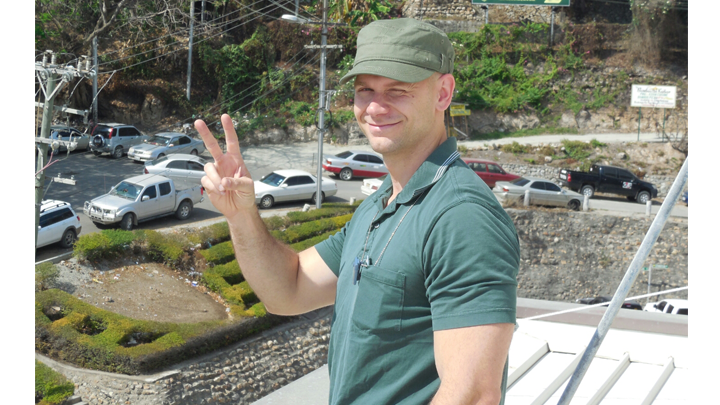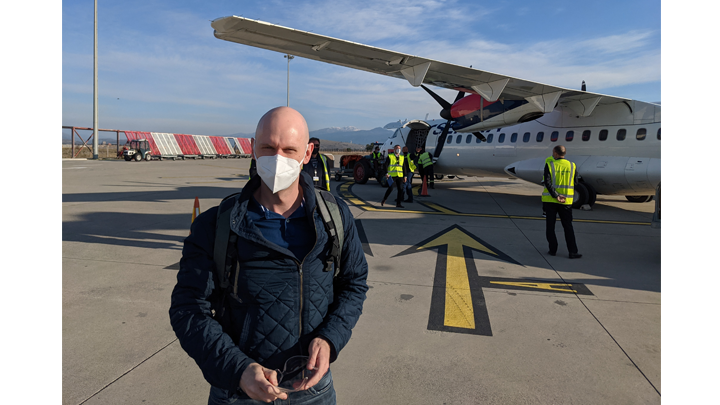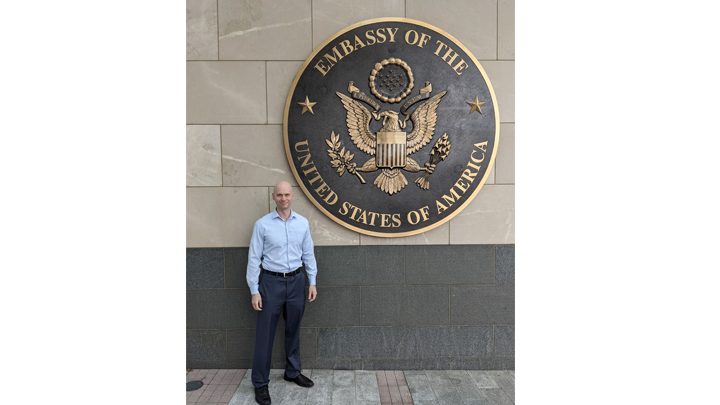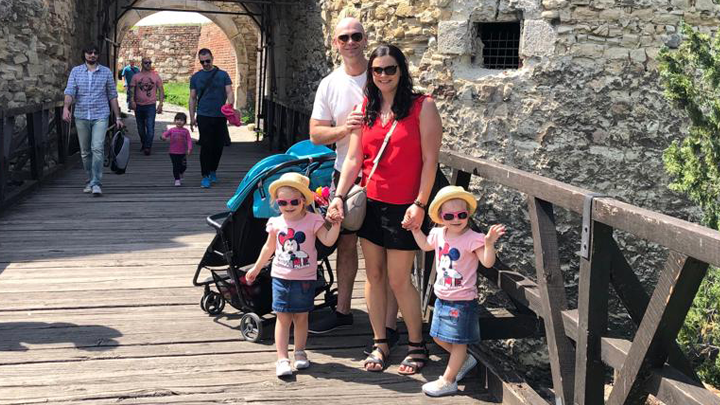College of Engineering News Room
Engineering Diplomacy: People, Information and Property
USF engineering alum and experienced security engineering officer Nickolas Kozlowski
recounts memorable moments from his career and what being in the United States Foreign
Service means to him.

Over his almost 10-year career, Nickolas Kozlowski has had five assignments and traveled to more than 22 countries for the U.S. Department of State’s Diplomatic Security Service (DSS) as a Foreign Service Security Engineering Officer (SEO). He met his wife while on temporary assignment in New Zealand, and their twin daughters have spent more of their childhood in Belgrade, Serbia — Kozlowski’s most recent overseas post — than they have back home in the U.S.
“It’s not just a job — it is a lifestyle, and it encompasses your entire life and your family’s life,” he said. “It opened my eyes to places and cultures that I would’ve only read about.”
After graduating from a Tampa high school and then from Hillsborough Community College with an associate degree, Kozlowski completed a Bachelor of Science in Mechanical Engineering at USF in 2009. He passed the Fundamentals of Engineering test soon after.
Against the backdrop of the 2009 recession and while still at the telecommunications job he worked throughout his engineering program, a customer recommended he apply for a position with the FBI. He passed several tests and interviews and got a training date for FBI Academy in Quantico in Virginia, where he trained for several months.
Following his training, he learned that the SEO position was accepting applications while working an administrative job at the FBI field office in Tampa. He said the position was usually only open once or twice a year and that he jumped on the opportunity to apply.
After a long process of interviews and testing, Kozlowski was accepted as an SEO. In March of 2012 he traveled to Washington D.C. for a two-year tour of duty — standard for most new officers — within the Bureau of Diplomatic Security’s countermeasures branch. After two years in Washington D.C., most new officers are then sent on their first tour overseas, and Kozlowski was posted in Canberra, Australia.
Though he was posted in Australia’s capital, his work led him to support consulates in Melbourne, Sydney and Perth, as well as embassies outside Australia in Wellington, the capital of New Zealand – where he met his wife – Port Moresby, the capital of Papua New Guinea, Suva, the capital of Fiji and Apia, the capital of Samoa. While the U.S. has one embassy and one ambassador in the capital of most countries around the world, there may be several different consulates in larger countries.
“That posting gave me a lot of travel opportunities, so I spent those two years traveling all over the Pacific — even going into Thailand and Cambodia,” he said. “That’s where a lot of the countries in the list I’ve been to begin to check off.”
Following his time posted in Canberra, Kozlowski spent another two years in the U.S. supporting SEOs, security technical specialists and U.S. Navy Seabees abroad before being assigned to a post in Belgrade in 2018, which he personally oversaw. He also regularly traveled to a nearby post in Podgorica, the capital of Montenegro, and the capital cities of both Kosovo and Georgia.

As one of more than 200 SEOs worldwide, Kozlowski’s primary job is to “protect Department of State personnel, facilities, and sensitive information against acts of crime, terrorism, and technical espionage,” as described on the U.S. Department of State website.
“It’s about protecting people, information and property,” he said. “That’s the main goal of my position in Diplomatic Security — to make a safe and secure environment for diplomats to conduct diplomacy.”
To do so, Kozlowski leverages a slew of technical skills to install and repair security systems capable of detecting and deterring threats, both physical and digital, to U.S. diplomats and foreign dignitaries. These range from vehicle barriers and alarm systems to CCTV networks and access control systems that restrict areas via swipe badges.
SEOs are also trained in technical surveillance countermeasures that give them a variety of tools and techniques to discover electronic eavesdropping devices and evaluate weaknesses in meeting locations and structures that could compromise sensitive information.
This training proved very useful when Kozlowski was on temporary duty and needed to replace an alarm system inside an old bank that had been converted into a diplomatic post. This post did not have a Marine Security Guard (MSG) detachment, which provides 24/7 monitoring of U.S. diplomatic facilities, so an alarm system was mandatory to remotely monitor the post from the Diplomatic Security Command Center back in Washington D.C.
“The old system was obsolete, and they didn’t make parts for it anymore so time was of the essence,” he said. “You’re in there overnight, on the weekends, trying to make sure that you’ve left the place better than you found it. Everything has to be as it should be before you got on your plane because if it isn’t, one of the regional security officers might have to sleep there until a technical specialist can get there. It can become stressful when the clock is ticking.” Kozlowski said that when installing systems in their posts, SEOs also need to create turnover documents for the next SEO assigned after them so they know what “normal” is for the systems at that post.
The COVID-19 pandemic brought additional challenges to Kozlowski’s SEO responsibilities. With travel restrictions in place, Kozlowski had to become an expert at remotely coaching non-technical embassy or consulate staff to help with equipment failures. He recalled when a broken fiber optic cable in a post took out its security cameras and required him to guide the post’s staff through identifying the break and rerouting parts of the system to bring it back online.
“We basically played mission control to their Apollo 13-sized problem,” he said. “We had to find some creative solutions.”
Kozlowski said that one of the most important qualities of an SEO is adaptability, as plans or goals he’d set in a day could all change in an instant. In a profession with rapidly shifting priorities and where most unexpected events feel like crises, he said that it’s rare to have the kind of uninterrupted focus one could expect while working on traditional engineering projects.
He may not even have the proper tools or components for the task at hand, depending on his location. Kozlowski needed to solve some of his post’s problems in Port Moresby with equipment he made himself due to the lack of parts availability at local stores.
Port Moresby’s high crime rate also made personal safety an issue, and he and fellow colleagues needed to coordinate their movements through the area in a specific set of vehicles.
“I think Diplomatic Security does a good job for the foreign service staff in recognizing these situations, and they try to train you as best they can with certain seminars and courses that prepare you for living and traveling in stressful environments,” Kozlowski said.
While danger in some locations is apparent and makes it mandatory for Foreign Service Officers and Specialists to be unaccompanied by family members and loved ones — including posts in Baghdad, Kabul and Islamabad — dangerous situations can crop up at any time, like when someone threw a grenade over the fence of Kozlowski’s post in Montenegro or when an intruder climbed over a security fence on to the embassy compound at another time.
“It doesn’t matter where you are in the world, whether you think it’s safe or not, civil unrest is something you have to be prepared for,” he said. “When the situation becomes too unsafe for folks at post, families have to leave rather quickly, and it can be stressful when things like that happen. As SEOs, we’re often the last to leave if they shut down a consulate or an embassy.”
Kozlowski said it takes a lot of people to accomplish the mission of DS and that working closely with local staff is essential. SEOs rely on their expertise to fill gaps in proficiencies. This could be anything from carpentry and wielding to knowledge of blast-resistant doors, all needed to make repairs or install systems to meet the needs of the MSGs and local guard force who monitor these posts.
“There were a lot of really skilled local craftsmen in Belgrade who can take nothing and make it into something in an instant,” he said. “There’s always a way they can get it done. It’s definitely been humbling at times.”
While SEOs don’t conduct diplomacy personally, they still represent the U.S., making it especially important for them to respect the cultures and communities they work within while overseas. Kozlowski said many of the people he worked with in Port Moresby possibly hadn’t met an American, while those in other locations may have already had preconceived notions of Americans, increasing the necessity of leaving a good impression.
Kozlowski also views his SEO service within the broader context of the United States’ collaboration with its four partners in the Five Eyes alliance — Canada, the U.K., Australia and New Zealand. The alliance is built on an intelligence-sharing agreement between security and intelligence organizations within each member country whose personnel work together to improve best practices in their fields, including security.
“It really is a collaborative effort because it takes a lot to maintain a high level of security,” he said. “We have a sort of informational trade agreement. They bring a lot to the table, and DS has SEOs embedded in some of these countries, and they in turn have personnel stationed in Washington D.C.”
Kozlowski and his family left Serbia in May to return to Washington D.C. themselves. For the foreseeable future, Kozlowski said he plans to continue working as an SEO and that he expects he and his wife will soon be able to start checking off their wish list of places around the world to live and work with this next assignment. Their lifestyle demands high levels of mobility and flexibility, and he said that there may come a time when they need to refocus what their family needs, but that time hasn’t come yet.
“Your family has a story to tell because they’re accompanying you, and in our case our twin girls will definitely have a story to tell,” he said. “It’s definitely challenging to have to uproot and move every so often, but there’s definitely benefits that compensate for being overseas.”
The U.S. Department of State SEO position is open for applications this year until August 17. Learn more about the position here.

